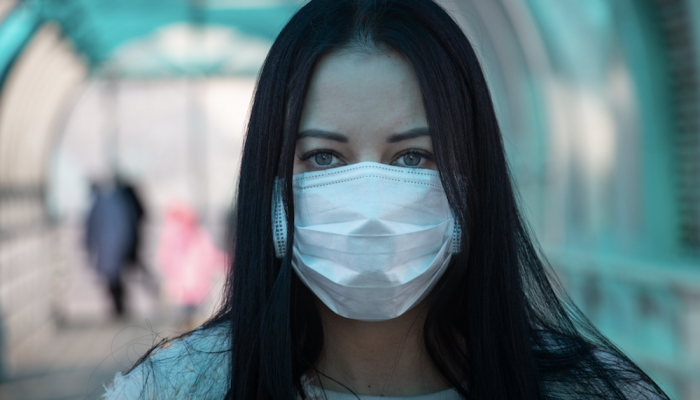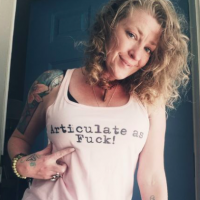If the coronavirus is showing us anything, it is that we are all connected.
Our choices, the actions that we take—and don’t take—have an impact on lives that we may never know.
I didn’t just hit a wall tonight. It came crashing at me. I’m doing the things necessary to stem this epidemic—staying home and social distancing. My hands are dry from washing them. Tenderness blooms, unrequited, in the absence of physical connection, as I live alone. Restaurants and cafes I frequent are shut down, following health and safety guidelines. Even if they weren’t, I wouldn’t patron them right now. It’s not worth the risk.
COVID-19 has been steadily increasing in severity as infection rates climb, and people do too little, too late, in too many cases, to stop it.
It is our own arrogance and selfishness we are battling. Those who refuse to slow down, sit down, and deal, head-on, with this experience are not only putting themselves and their loved ones at risk, but also people they have never even met.
Just the other day, I was speaking with a client who was at her wit’s end because her adult son would not stop going out after work, traipsing back and forth over county lines. His lack of willingness to participate in their family in a mature, mutual way has been a problem for a long time. It is something that we have discussed ad nauseam infinitum. She has laid down boundaries and changed some deeply ingrained habits of her own. He doesn’t listen.
As she shared with me what he was doing—his blatant disregard for her or his own safety, the wanton recklessness that he was exhibiting—I got mad. I started pushing her hard to do something.
People are triggered right now. A crisis activates our unresolved wounds, and we either regress into selfishness and incompetence, or we rise in accountability and maturity, acknowledging fear and pain, and bending our will to be of benefit. My client tends to freeze or get defensive when threatened; those are physiological responses to trauma. A psychological response is to fawn. I dare say, the risk of losing the connection with her son was leading her to fawn with him, yet as I pushed her, she exploded at me and admitted to feeling defensive. I replied,
“When people push you to the point where you need to protect yourself, they are usually doing so either maliciously or unconsciously. I’m not. I’m doing this because I love you. I’m worried about you, and I want you to be safe. Your son is putting your whole house in danger.”
We both broke into tears. Even now that fierceness rises and the screen blurs. These are the conversations some of us need to be having right now. I’m happy to share that after she confronted him, yet again, he is now staying in.
Addressing any neuroses within an individual, or group, for that matter—with compassion—is not about pointing the finger in blame; it is about calling out an unsustainable or dangerous behavior and, for the good of all, challenging it and containing it.
When faced with a difficult situation, avoidance is often used as a coping strategy. This is not a situation that can be avoided. Continuing on as if it is business as usual denotes an absence of compassion, in most situations, and this couldn’t be more true than with our specific conditions with the coronavirus.
To stop the spread of suffering, we must open our eyes, minds, and our hearts. We need quick, rational responses, and we need long-term empathy.
The prognosis for how long we must live by these limited guidelines for social interaction gets extended by the day. The longer we continue to flaunt our need to maintain the convenience of our regular lifestyles, the longer we linger in limbo. It is those same lifestyles that got us into this mess in the first place.
Our addictions to our amenities have left us, as a species, more susceptible to this pandemic. Susceptible is a telling term. Even before the outbreak, we cannot say that living conditions for many people were humane. For example, the numbers of deaths from hunger are astronomical—over two million this year. (You can click here to see a live counter. It’s heartbreaking.)
I do not share this information to detract from the severity of coronavirus, but more to highlight the fact that things like world hunger and pollution, as well as the virus, are symptoms of a larger illness, and we need to look at that, too. We are, not so slowly, strangling our world with plastics, and with selfishness and greed. We are weakening our immunity and humanity, and it’s time to sit down, feel our grief, and really be with what we’ve done. Perhaps this is the wall that I hit tonight.
I meditate, feeling the collective pulse—fear and panic, but a quiet grace as well. And I gather information. There are patterns emerging that are both encouraging and disturbing.
What stopped governments from giving early warning signs to their people? Arrogance and greed.
Rather than sounding a global alarm, China—where the virus originated—tried to keep it under wraps. The first case of COVID-19 was documented in November of 2019.
Italian government official Nicola Zingaretti promoted a business-as-usual attitude over aperitivos, as he shared this sentiment, #MilanDoesn’tStop. That was on February 27th. Now all of Italy has stopped, with 59,000 cases of coronavirus, and a national lockdown in place.
In the United States, reports surged across President Trump’s desk for months, yet the virus was reported as a democratic hoax, by some sources. And when it finally came time to make the crucial public announcement, several United States senators sold millions in stocks before the market crashed. Their stock portfolio was more important than public safety.
So now we get more grief, more stress, more lives lost, because these government officials were too arrogant to take compassionate action on behalf of their people. And that is the same attitude that will keep this spreading amongst us—that will keep people suffering.
Amidst tragedy and uncertainty, there are also reports of humane, generous acts being spread. From landlords suspending rent, to Jose Andres, a New York restauranteur, offering up his restaurants as community kitchens. People from all over the world are sewing face masks to provide for epidemic-caused shortages. (Click here to find a pattern.) Pollution is down in every area where lockdown measures have been enacted. The earth is immediately trying to heal herself, but she will need our help. The grace we find will be the care we discover for each other.
This is where we walk, eyes and hearts open, through the hard, holy, and human together.








Read 28 comments and reply